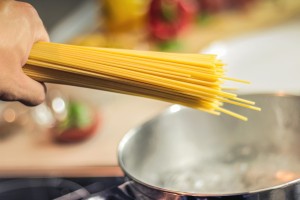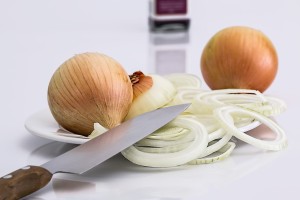- Calls to this hotline are currently being directed to Within Health, Fay or Eating Disorder Solutions
- Representatives are standing by 24/7 to help answer your questions
- All calls are confidential and HIPAA compliant
- There is no obligation or cost to call
- Eating Disorder Hope does not receive any commissions or fees dependent upon which provider you select
- Additional treatment providers are located on our directory or samhsa.gov
Cooking for Yourself When Living Independently
Contributor: Crystal Karges, MS, RDN, IBCLC, Special Projects Coordinator at Eating Disorder Hope/Addiction Hope
 The transition to college comes with many new responsibilities, and students are primarily adjusting to living on their own and caring for themselves. While college students are typically of adult age, this time can still be a transition, especially coming from living within a family home structure. If you are a student who is making the transition to college, it is important to be prepared for the upcoming transition of living on your own and the challenges this may present, particularly if you are in recovery from an eating disorder.
The transition to college comes with many new responsibilities, and students are primarily adjusting to living on their own and caring for themselves. While college students are typically of adult age, this time can still be a transition, especially coming from living within a family home structure. If you are a student who is making the transition to college, it is important to be prepared for the upcoming transition of living on your own and the challenges this may present, particularly if you are in recovery from an eating disorder.
Many People Lack Cooking Skills
 If you have been living at home with your parents and family, you may be used to some sort of structure, such as having family dinners or even just being able to rely on food being readily available. Living at home often comes with many perks that are not realized or appreciated until you move out of the house, such as having home cooked meals or a pantry/refrigerator that are regularly stocked with food. These things, though simple, often take the guesswork out of planning what you want to eat or when you need to grocery shop or cook.
If you have been living at home with your parents and family, you may be used to some sort of structure, such as having family dinners or even just being able to rely on food being readily available. Living at home often comes with many perks that are not realized or appreciated until you move out of the house, such as having home cooked meals or a pantry/refrigerator that are regularly stocked with food. These things, though simple, often take the guesswork out of planning what you want to eat or when you need to grocery shop or cook.
Living independently requires self-sufficiency with cooking and preparing meals for yourself. Eating regularly is essential to survival, health, and the ongoing recovery from an eating disorder. Eating out and buying ready-made foods are always options, but building skills in cooking and preparing meals for yourself is essential. Many individuals feel intimidated about cooking or feel unsure about how to navigate through the kitchen. However, preparing basic foods and meals is something anyone can do with little practice. You just need resources – both basic tools for the kitchen and food for preparing.
You Don’t Need All the Gadgets
Some people stray away from cooking because they do not want to deal with the hassle of kitchen tools. Even with the smallest kitchen, you only need a handful of basic essentials to cook most things, and many of these things can be purchased at discounted rates. Some basic equipment you might need include a cutting board, utensils (including spatula, whisk, tongs, eating utensils), a basic knife set, measuring cups and spoons, a sauté pan, soup pot with lid, and a saucepan. You should be able to cook many things with even the most basic kitchen tools.
 Having some recipes to follow can also help give you an idea of how to put something together, step by step. Many basic recipes are accessible online and include a wide variety of dishes, cuisines, and types of meals. Do you have a good friend or family member who is confident in the kitchen? If so, consider asking for some help and support as you learn to cook for yourself.
Having some recipes to follow can also help give you an idea of how to put something together, step by step. Many basic recipes are accessible online and include a wide variety of dishes, cuisines, and types of meals. Do you have a good friend or family member who is confident in the kitchen? If so, consider asking for some help and support as you learn to cook for yourself.
Many basic meals can be put together with little to no preparation, such as sandwiches, salads, breakfast foods and more. Some people worry that in order to cook for themselves, they need to put aside a large amount of time, which can seem out of the question for a busy college student. The reality is that many foods can be put together, even in a time crunch.
Skills Build with Experience
 The important thing to remember as well is that learning how to cook for yourself while living independently is not something that is done overnight. Cooking is a skill that is often learned over time, and with practice and dedication, you will find yourself becoming more at ease in the kitchen and more familiar with different foods. Aim for progress, not perfection, and know that eating regularly and consistently is more crucial than creating the “perfect meal”. This might mean eating a microwaveable meal some nights or a bowl of cereal for breakfast on mornings that you have little time to cook. The important thing is that there are no obstacles that are preventing you from eating consistently and regularly, including being afraid of cooking or not being sure how to cook for yourself.
The important thing to remember as well is that learning how to cook for yourself while living independently is not something that is done overnight. Cooking is a skill that is often learned over time, and with practice and dedication, you will find yourself becoming more at ease in the kitchen and more familiar with different foods. Aim for progress, not perfection, and know that eating regularly and consistently is more crucial than creating the “perfect meal”. This might mean eating a microwaveable meal some nights or a bowl of cereal for breakfast on mornings that you have little time to cook. The important thing is that there are no obstacles that are preventing you from eating consistently and regularly, including being afraid of cooking or not being sure how to cook for yourself.
The transition to living independently can bring many challenges but also much opportunity for room and growth. Know that there are many resources to help support you through any transition to ensure that you remain successful.
Community Discussion – Share your thoughts here!
What are some tips and suggestions that have helped you when cooking for yourself? What has helped you stay on track in your own recovery when living independently?
Last Updated & Reviewed By: Jacquelyn Ekern, MS, LPC on September 3, 2015. Published on EatingDisorderHope.com

